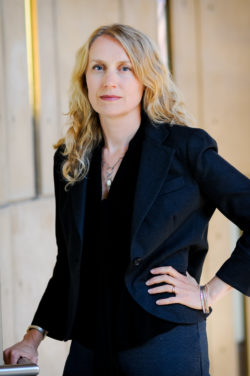Stanford Law School Professor Michelle Wilde Anderson Honored with American Law Institute’s Early Career Scholars Medal
The American Law Institute (ALI) has announced it will honor Michelle Wilde Anderson, Stanford Professor of Law, Robert E. Paradise Faculty Fellow for Excellence in Teaching and Research, with its Early Career Scholars Medal. The medal recognizes outstanding law professors whose work is both relevant to public policy and has the potential to influence improvements in the law.
“I feel like I have the best job in the world. I get to be not only a teacher and writer, but also an attorney,” said Professor Anderson.
“I don’t think my scholarship has yet lived up to the work of the local officials and public interest lawyers that I’ve gotten to work with over the years, but this award is a new blast of motivation to keep trying to do just that. I am incredibly grateful to ALI for their dedication to our profession, and to Stanford Law School for supporting ‘applied’ work in the legal academy.”

“Michelle possesses a unique ability to combine close-to-the ground knowledge of the lived reality of those who reside in America’s most challenged cities with a sophisticated, rigorous, and hard-headed understanding of the institutions–and their capacities and limits–that are supposed to serve those citizens,” said M. Elizabeth Magill, Dean and Richard E. Lang Professor of Law. “ALI has rightly recognized that Michelle is working on one of the most pressing issues of our time–concentrated poverty–and her work will help us see the way forward on this vexing challenge.”
Professor Anderson is a scholar of state and local government law, and her research seeks to shed light on phenomena such as geographically-concentrated poverty and municipal fiscal distress. Her recent publications explore restructuring (such as bankruptcy, disincorporation, and receiverships) in cities and counties facing chronic poverty related to deindustrialization. These issues affect not only Rust Belt capitals such as Detroit, but also post-industrial cities in California, rural counties in the West and South, and small towns across the country.
“Michelle’s scholarship on regions facing economic dislocation and concentrated poverty has the potential to improve conditions in these communities,” said California Supreme Court Justice Mariano-Florentino Cuéllar, Stanford Law School Visiting Professor and chair of ALI’s Early Career Medal Selection Committee in the ALI announcement of the medal. “By underscoring the importance not only of intelligence but practicality, [her] work embodies the ideals of the American Law Institute.”
Prior to joining Stanford Law School in 2014, Anderson was an assistant professor of law at the University of California Berkeley Law School. She has been a research fellow at the European Commission’s Urban Policy Unit in Brussels and an environmental law fellow at Shute, Mihaly & Weinberger. She clerked for Judge Guido Calabresi on the U.S. Court of Appeals for the Second Circuit and Judge Marilyn Hall Patel of the U.S. District Court for the Northern District of California.
Professor Anderson will be recognized at ALI’s 95th Annual Meeting this coming May in Philadelphia, PA.
About Stanford Law School
Stanford Law School is one of the nation’s leading institutions for legal scholarship and education. Its alumni are among the most influential decision makers in law, politics, business and high technology. Faculty members argue before the Supreme Court, testify before Congress, produce outstanding legal scholarship and empirical analysis, and contribute regularly to the nation’s press as legal and policy experts. Stanford Law School has established a new model for legal education that provides rigorous interdisciplinary training, hands-on experience, global perspective and focus on public service, spearheading a movement for change.
